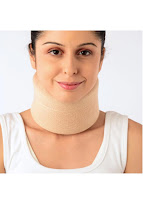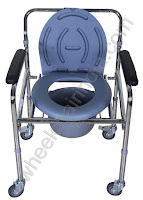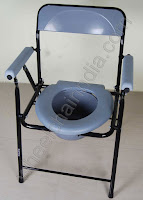A cervical collar, commonly known as a neck collar, is a medical device utilized to support a person’s neck. It is used by emergency personnel for those who have had traumatic neck or head injuries and can be utilized to treat chronic medical conditions. Cervical neck collars are commonly used by patients who had a surgical intervention of cervical spine to immobilize the neck. It is used for the treatment of cervical neck pain. For instance after a whiplash injury, the neck collar will be utilized for both immobilization and to reduce pain. Vissco Cervical Collar Soft are utilized therapeutically to help realign spinal cord and relieve pain though they are not worn for long periods of time. An individual may also need a cervical collar to support the neck during recovery after surgery like cervical spinal fusion.
Steps to Wear a Cervical Collar : Patients/caretakers need to follow the below steps while wearing the collar.
 |
| Our Price : Rs 185 |
- Stabilize the neck
- Shift their torso to the left without twisting the neck
- Cautiously place the collar’s back around the neck
- Place the front part of the collar on the neck
- Move the frontal side flaps to the back
- Tighten the velcro straps to secure the collar
A neck brace is a temporary device to help your neck relieve and heal neck pain. It is important to wear your neck brace properly to get the maximum benefit. A good neck brace must decrease motion but not cause discomfort, so let your doctor know if your neck brace is uncomfortable.
Shoulder Sling : You may find yourself in a Shoulder Sling for a variety of reasons. The sling helps support your arm after injury or surgery on the arm, shoulder or collarbone. Some people only need it for a short period of time, while others will wear a sling for many weeks. Regardless of how you ended up with it, wearing a shoulder sling can be a challenge.
Clavicle Fractures : The only bony connection between the axial skeleton and the upper extremity occurs through the clavicle, which is held securely in place by ligaments at the sternum and acromion. The clavicle overlies and protects the brachial plexus, pleural cap, and great vessels of the upper extremity. Clavicle fractures are among the most common injuries, accounting for one in 20 adult fractures.1 The injury usually is caused by a fall on the lateral shoulder or, less commonly, by a direct blow or by falling on an outstretched arm.
























